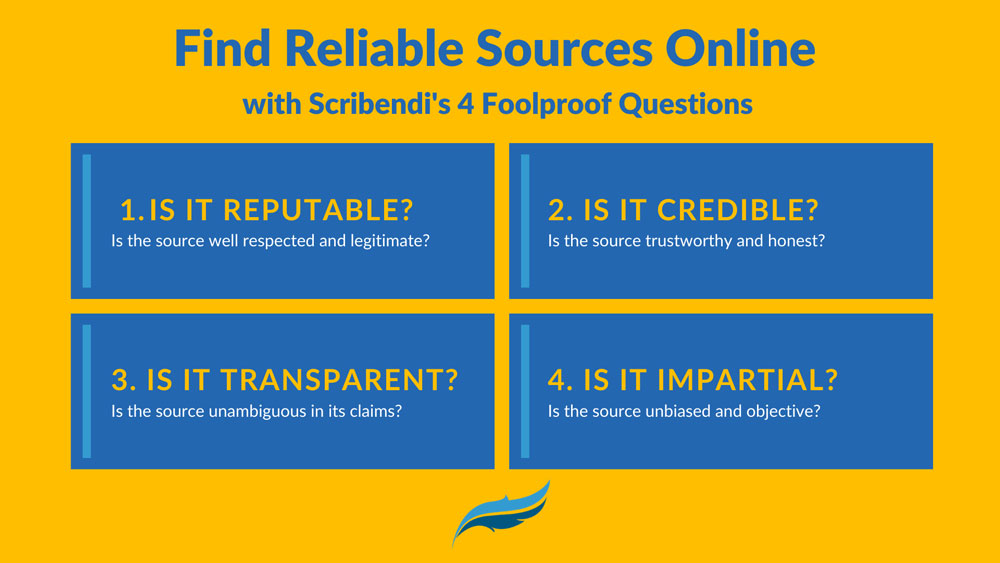Written by Scribendi
"A good reputation is more valuable than money," said Publilius Syrus.
Or did he? Well, what he actually said was Honesta fama melior pecunia est. Did you know that Publilius Syrus was a circus performer?
Wait. How do you know if anything you read online is a reliable source?
No, this isn't yet another article about "fake news."

Of course, how news is reported, or even whether it's reported at all, is a very important topic. However, in this article, we're concerned with finding credible and reliable sources online more generally—that is, beyond journalism.
For example, the Mayo Clinic says that margarine is better for you than butter. That's big—if it's true. But is it true?
We first have to ask some questions. Is the Mayo Clinic a reliable source? Well, it's certainly well known. What about the claim itself? Is it believable? Considering what we know about saturated fats, it's easy enough to believe. And the article, does it say which sources it relied on? Yes, references are provided.
All things considered, it is probably a reliable source of information.
Researchers need credible sources of information. Such reliable sources are those upon which people can depend and trust. One can't really trust Wikipedia, the encyclopedia that anyone can edit, as a credible source. Why not? Well, precisely because anyone can edit it! Did a particular contributor know what he or she was talking about when editing the article? Did he or she do research using reliable sources when adding that fact? Was he or she unbiased when making that statement? Maybe. Maybe not.

So, what makes a source reliable? Scribendi's here to help! Here are four foolproof questions you should ask about any source you want to rely on before doing so.
1. Is It Reputable?
To determine whether a source is reliable, it is important to check whether it is reputable.
A good reputation is slow to acquire. Academic journals build a reputation over time by consistently selecting high-quality research and reviewers. News media build a reputation through rigorous investigation and fact checking. Schools build a reputation by recruiting good researchers and lecturers.
However, just because you haven't heard of certain sources doesn't mean they aren't reliable sources. Many people have never heard of the Canadian Centre for Policy Alternatives (CCPA), for example, but the CCPA publishes high-quality research.
"Really?" You might ask. "How do you know?" By answering our other three questions.
2. Is It Credible?
If you're unsure whether a source is reputable, you should also check whether it is credible. If a claim challenges common sense, it must be scrupulously examined. If a philosopher makes the argument that we're all living in a computer simulation, said philosopher had better provide some strong arguments for said claim. If a team of researchers makes the following argument: "Artists who paint with their toes have 'toe maps' in their brains," they should explain exactly and precisely: 1) the assumptions they made and 2) how they collected and interpreted the data that led them to such a conclusion.
Many believe that increasing the minimum wage causes unemployment because employers can't afford to pay workers the higher wage. The CCPA examined the data and made the opposing claim that this isn't true. It turns out that the CCPA is right: When the minimum wage in Ontario jumped from $11.60 to $14.00 an hour, the unemployment rate actually dropped, and the inflation rate didn't change.
3. Is It Transparent?
Reliable sources are transparent. They tell you where, how, and from whom they collected their information. This makes it possible to verify the information yourself and is why so many researchers are pushing to make all data publicly available.
All research builds on previous work. A good research report will provide citations to relevant prior work. Now that we're well into the Information Age, online citations should be hyperlinked, placing "the essential components of qualitative analysis—evidence, interpretation of evidence, and methodological selection criteria—just one click away from readers."
If a source actively encourages you to review its sources, odds are that it's reliable.
The CCPA's publications, incidentally, are always transparent.
4. Is It Impartial?
There is no avoiding bias. It's inevitable because it is unconscious. Still, reflection and self-awareness are worth pursuing so that bias can be detected, confronted, and diminished.
Detected? How? This is done through honest disclosure. Credible sources always disclose any funding the author(s) received. They are also open about any possible conflicts of interest. As is well known in legal circles, the perception of bias matters as much as the bias itself!
It wasn't always this way. Look into the history of research on sugar, tobacco, or fossil fuels for examples of biased research. The road to openness and honesty has been winding and all uphill.
Conclusion
Test your new skills by asking yourself: Is this article itself a reliable source of information on finding reliable sources?
Ask yourself the four questions:
- Is it reputable?
- Is it credible?
- Is it transparent?
- Is it impartial?
If you can answer all four questions with a resounding "Yes!", you know you can rely on Scribendi as a reliable source. You can also use the handy graphic below when performing this exercise on any source to check whether it's reliable.

Once you've chosen your sources, next comes the pesky business of citing your credible sources appropriately. Scribendi can help with that, too! Check out Scribendi's guides for citing using the major style guides, including APA, MLA, Chicago, and Turabian. If your paper's already been written and you want to make sure you've cited your reliable sources appropriately using the style of your choice, Scribendi's editors can also help you there.
Happy writing!
Image source: elements.envato.com
Let Us Format Your Citations to Any Style Guide
Hire an Expert Academic Editor, or Get a Free Sample
About the Author
Scribendi's in-house editors work with writers from all over the globe to perfect their writing. They know that no piece of writing is complete without a professional edit, and they love to see a good piece of writing turn into a great one after the editing process. Scribendi's in-house editors are unrivaled in both experience and education, having collectively edited millions of words and obtained nearly 20 degrees collectively. They love consuming caffeinated beverages, reading books of various genres, and relaxing in quiet, dimly lit spaces.











